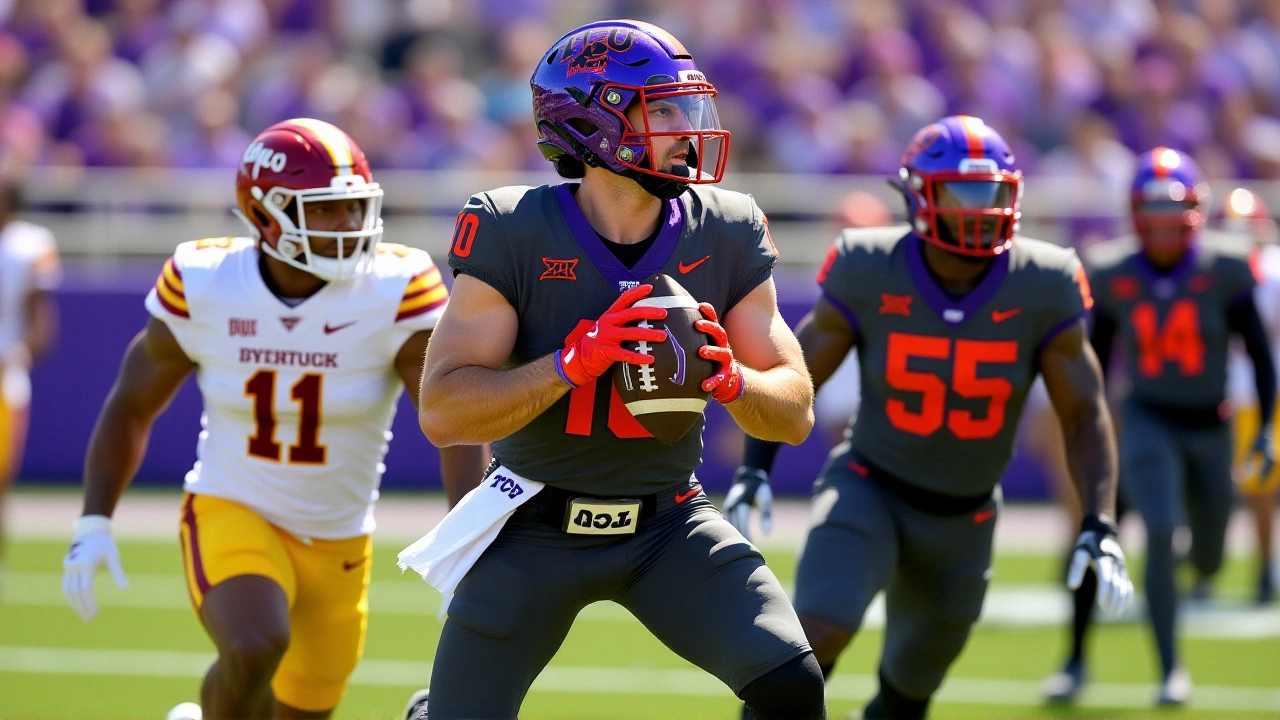The BYU Cougars and TCU Horned Frogs are set to clash in one of the most hotly contested Big 12 Conference matchups of the 2025 season — a Friday night showdown at LaVell Edwards Stadium in Provo, Utah. With kickoff scheduled for 10:15 p.m. Eastern Time on November 15, 2025, the game isn’t just another Week 12 contest. It’s a rivalry renewal, a betting magnet, and a battle of conflicting narratives that have oddsmakers scratching their heads.
Conflicting Odds, Confused Bettors
The betting lines for this game don’t just vary — they contradict. FOX Sports 1700 lists BYU as a 3.5-point favorite, with a moneyline of -169 for the Cougars and +142 for TCU. But then, in another section of the same article, those numbers shift to -151 and +127. Meanwhile, CapperTek — a data-driven sports analytics site — has BYU favored by 5.5 points at -209 on the moneyline, while TCU sits at +172. The over/under isn’t any clearer: FOX Sports says 51 points; CapperTek says 52.5. And then there’s Vegas Insider, tracking line movements like a detective following a trail of breadcrumbs. The spread opened at BYU -4.5, then slid through -4, -3.5, -3, and even dipped to -1.5 before stabilizing at -3. The total? It started at 51.5, dropped to 24.5 (a likely data glitch), then jumped back to 52.5. These aren’t minor fluctuations — they’re signals. Someone, somewhere, is betting big on one side. And oddsmakers are scrambling to adjust.Why the Disagreement? AI vs. Gut Feeling
Here’s where it gets interesting. FOX Sports 1700 leans on a “team strength comparison algorithm” that factors in scoring margins and quality of wins. Their prediction? BYU 33, TCU 20. They’re picking the Cougars to cover the -3 spread and the over on 51 points. But CapperTek — backed by over a decade of machine learning research — says the opposite. Their AI simulation, trained on 10,000+ historical matchups, spits out TCU 31, BYU 20. They’re betting on the Horned Frogs to cover +5.5 and the under on 52.5. Two different models. Two completely opposite outcomes. One is built on traditional stats. The other on neural networks trained on decades of college football data. And here’s the twist: neither is wrong. That’s the beauty — and danger — of modern sports betting. The market isn’t about truth. It’s about perception.History Says BYU Should Win. But Does It?
The numbers on paper favor BYU. They’re 6-3-0 against the spread this season. When favored by 3+ points — which they’ve been five times — they’ve covered three of those games. That’s a 60% cover rate. Solid. Reliable. TCU? They’re 4-4-1 ATS. And when they’ve been underdogs by 3+ points? They’ve failed to cover — once. That’s a small sample, sure. But in college football, small samples often tell big stories. TCU’s offense has been inconsistent. Their quarterback has thrown six interceptions in the last three games. BYU’s defense? They’ve held three straight opponents under 20 points. But wait — TCU’s last two wins came against ranked teams. One by 17. Another by 14. They’ve shown they can win ugly. And BYU? Their wins have been close. They beat Utah State by 3. They barely edged out West Virginia by 2. That’s not dominance. That’s survival.What’s Really at Stake?
This is the 10th meeting since TCU joined the Big 12 in 2012. BYU has won six of those games — but only two by more than a touchdown. The last time they played, in 2023, TCU won 38-31 in Fort Worth. The Horned Frogs have been the more explosive team historically. BYU has been the more disciplined one. The real story? Momentum. BYU’s offense has improved since midseason. Their new running back, Brayden Bowers, has rushed for 112 yards per game over the last four weeks. TCU’s defense, meanwhile, has allowed 30+ points in three of their last five games. The Cougars could exploit that. But TCU’s coach, Sonny Dykes, is a master of late-game adjustments. He’s won three games this season by coming back from double-digit deficits. If this game’s tied at 24-24 with five minutes left? Don’t bet against him.What’s Next?
The line will keep moving. Sportsbooks like FanDuel and Caesars will adjust based on where the money flows. If 70% of bets are on BYU, expect the spread to shift to -4.5 again — even if the logic doesn’t justify it. The winner? Whoever reads between the lines. Don’t just follow the odds. Watch the injuries. Track the weather (Provo’s forecast calls for 42°F and light wind — perfect for passing). And pay attention to the pregame hype. TCU’s players have been talking about “proving something” all week. BYU’s coach? He’s silent. That’s not confidence. That’s calculation.Final Thoughts
This isn’t just a game. It’s a referendum on how we predict sports in the age of AI. Is it better to trust human intuition backed by stats? Or an algorithm trained on thousands of data points? The answer might be neither. Sometimes, the best bet is the one nobody’s making.Frequently Asked Questions
Why are the betting lines so inconsistent between sources?
Different sportsbooks and analysts use different models. FOX Sports relies on traditional metrics like scoring margin and strength of schedule, while CapperTek uses machine learning trained on over a decade of college football data. Some platforms also adjust lines based on where the majority of bets are placed — not necessarily where the true value lies. This creates a fragmented market, especially in high-profile matchups like BYU vs. TCU.
Which team has the edge historically in this rivalry?
BYU leads the all-time series 6-3 since TCU joined the Big 12 in 2012, but only two of those wins came by more than a touchdown. TCU has won the last two meetings, including a 38-31 victory in 2023. The Horned Frogs have shown more explosive offensive potential, while BYU tends to win with defense and time of possession. The home-field advantage at LaVell Edwards Stadium has been a factor in five of BYU’s six wins.
How have both teams performed against the spread this season?
BYU is 6-3-0 ATS in 2025, covering in 3 of 5 games when favored by 3+ points. TCU is 4-4-1 ATS, and they’ve failed to cover in their only appearance as a 3+ point underdog. That suggests BYU is more reliable when expected to win, while TCU struggles to outperform expectations — even when they win outright. However, TCU’s wins have often come in dramatic fashion, which could make them a sneaky value play.
What’s the most likely outcome based on current trends?
The most probable outcome is a low-scoring, defensive battle — likely under 52.5 points. BYU’s defense has held four of their last five opponents under 24 points, and TCU’s offense has been inconsistent, especially in the red zone. While BYU is favored, their recent wins have been narrow. A final score of 27-24 in favor of BYU feels realistic — covering the -3 spread and staying under the total. But don’t count out a TCU upset if their defense forces three turnovers.
Should I bet on the over or under?
The under on 52.5 is the smarter play. BYU’s average points per game is 26.4, and TCU’s is 28.1 — but both teams have played slower-paced games in November. The last three meetings between these teams averaged just 46.7 total points. Weather in Provo will be cold and windy, which suppresses offensive output. Plus, TCU’s quarterback has struggled with accuracy under pressure. Betting the under at -115 offers better value than chasing the over.
Is BYU’s -3 spread a good value?
It’s close. BYU has covered 67% of spreads this season, but they’ve won by more than 3 points in only two of their nine games. TCU’s offense has shown flashes of brilliance, and BYU’s defense has given up 28+ points twice in the last month. If you believe in TCU’s ability to keep it close — as CapperTek’s AI does — then +3 is a better value than -3. The line feels inflated by public bias toward BYU’s home-field advantage.


